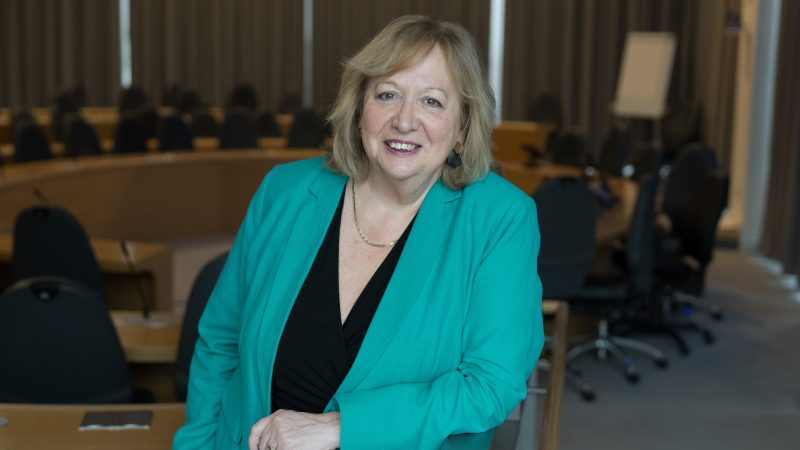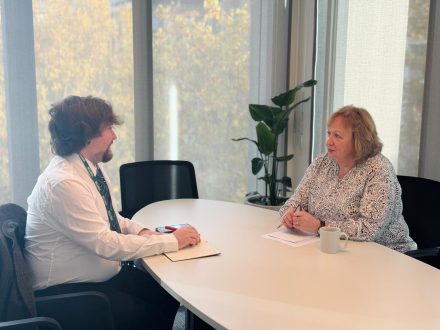
Members of Britain’s biggest trade union are voting to determine their future in Unison’s latest general secretary election.
In the midst of her bid for re-election after four years in post, I met with Christina McAnea at the union’s offices in Euston to reflect on her upbringing on a council estate in Glasgow, her political awakening from Jimmy Reid, and her work to make her union a powerful campaigning (and winning) force within the trade union movement.
Looking out over the bustling street below from Christina’s office, we began our interview on her bid for re-election. She encouraged members to look at her record over the last four years, highlighting a boost in membership by over 70,000, the creation of the Unison College to train members and putting more funding into the union’s branches and regions.
“We’ve got a strategy not just to grow the union, but to be a successful campaigning, winning union.”
 For McAnea, her time in office so far has been focused on giving a voice to those who don’t shout the loudest.
For McAnea, her time in office so far has been focused on giving a voice to those who don’t shout the loudest.
“We’re encouraging under-represented groups, and even for a union with one million women members, that also means women’s voices because too often they are still under-represented in out union, black members, disabled members, LGBT+ members, etcetra.
“One of the groups I am most concerned about is low-paid members. Somebody described them recently to me as the silent majority in most of our union. They face so many barriers to becoming active in our union; because of the jobs they do, they can’t get time off, they don’t get paid release from their employers – and I feel that responsibility really strongly to make sure that we’re making space for them in the union, that we’re making it easy for them in the union to come through and become leaders, to take decisions that affect them and that are relevant to them.”
How McAnea’s childhood shaped her politics
McAnea has personal experience of the plight that low-income households face, from her time growing up in a council estate in Drumchapel in north-west Glasgow.
“My mother was a lone parent when I was 11 and we never had any money. We lived a hand-to-mouth existence – you got paid, you spend money to feed you, hopefully it pays your rent and then you get paid again. There was never any spare money left over, so any kind of issue, like having to buy school shoes, was a massive thing for us.
“Seeing the poverty that we lived in, being able to see the unfairness even in the council estate where I grew up, we were one of the poorer families in that council estate, so even there you could see the difference between us and other people.”
Unlike other families, McAnea’s parents were both keen on pushing her, her two brothers and sister to get an education at a time when many children faced pressure to leave school to support their family.
“My parents weren’t like that, which was great – they really saw the value of education.”
As McAnea became more politically engaged around the age of 15 and 16, she recalled seeing the trade union activist Jimmy Reid speak, with his thoughts around opportunity and isolation resonating with her.
“I went along to hear him speak, and he was just amazing. He spoke about what I subsequently found out is the communist ideology about isolation.
“Working people don’t get opportunities, so they then become isolated – it was exactly what I saw in my parents and what I saw in my own life.
“Everyone has the potential to be anything they want in this world, but if you don’t get the opportunity to unlock that, then you end up stuck and you don’t end up exploiting your full potential, the full extent of what you can be.
“That really resonated with me when I heard him talking about that. That’s followed me right through my working life in the union movement, because too often people make assumptions about low-paid workers. They think low pay means not very bright, but in my experience nothing could be further from the truth. You meet the members of my union who work in low-paid jobs and you couldn’t meet a brighter, more intelligent and more articulate people.”
When McAnea joined a political party, her first port of call was the Communist Party, being a member for around a decade before joining Labour.
“I decided that actually if you want to make effective change, you have to be in power – and the only way that could happen for working people was through Labour.”
‘Affiliation doesn’t stop us from fighting against Labour’
At a time when Unite, one of the other titans of the British trade union movement, is reviewing its affiliation with Labour, McAnea argues Unison can use its connection to maximise what they can get for their members, highlighting work around fair pay agreements for care workers and measures included in the Employment Rights Act, such as scrapping zero hours contract and sick pay from day one.
Affiliation does not mean subservience – and McAnea was clear that Unison is always prepared to take on any government when needed.
“I’ll challenge any government across the UK. For me, the challenge will always be to take on any government, whether it’s at the national or local level, when they’re not acting in the best interests of Unison members.”
READ MORE: ‘Labour needs a reset’, says boss of Britain’s largest trade union
A recent example McAnea shared was over wholly-owned subsidiary companies within the NHS, known as ‘subcos’. Through subcos, services once provided in-house are instead provided by a separate company owned by the NHS trust, but crucially staff who work for them are excluded from NHS pay, conditions and pensions.
McAnea said she immediately went on the offensive to oppose the scheme.
“I spoke to [Health Secretary] Wes Streeting, I spoke to Jim Mackey, the chief executive of NHS England, and said we would fight them everywhere we did this.
“Every time a trust declared they were going to look at setting up a subco, we’d do a huge campaign about it. We’ve done things like this before, we can do it again.
“I spoke at the TUC and was all set to speak at the Labour Party conference, when a few days before, they announced that they were pausing this policy – and they said it’s because they’d listened to the unions, in particular Unison.
“I think having that link [with Labour] can be important, but it doesn’t stop us from campaigning and fighting against them when they have a policy we don’t support. I don’t feel constrained by the fact we’re affiliated to the Labour Party. Other unions are affiliated to Labour – they still manage to pick fights with them, and so do we.”

‘Everyone can see it’s not working’
Christina did not disguise her frustration with the Labour government, telling me the party has not yet delivered on the high expectations it set for itself as they were swept into office last July.
She said: “People in this country are still better off with Labour in Westminster, but it has to be a Labour government that will deliver for ordinary people in this country – and they haven’t done a particularly great job so far.”
McAnea expressed disappointment at a range of decisions made by the government so far, including the winter fuel allowance, “attacks” on welfare benefits, the failure to compensate Waspi women, delays in passing legislation banning conversion therapy and the continuation of the controversial two-child benefit cap – although both Keir Starmer and Rachel Reeves have signalled the policy may be axed in the Budget.
Her frustration also extends to how the government has sold its achievements. Although Christina said the government had delivered “the best piece of workers’ rights legislation in over 70 years”, she added: “You’d think it wasn’t happening – it’s kept quiet”.
“I wish they would be more positive about it and actually try and sell it to people, instead of always being embarrassed of it.
“I feel they need a reset. It’s not been working. You don’t need me to say that – everyone can see it’s not been working. The polls are terrible.
“I would like them to try and turn the corner by actually coming out with policies that they can see will make people’s lives better.”
READ MORE: Why don’t Labour’s workers’ and renters’ rights reforms cut through to voters – and how should they?
She called for a rethink of the Treasury’s fiscal policy and called on the wealthiest to be made to face the brunt of any tax hikes to pay for public spending or tackle the government’s debt bill.
“It’s always been the lowest paid or people on benefits that are expected to pay the price for the fact that the government’s not got much money. I think there is a real opportunity for the government to shift the dial and move the burden of taxation away from working people and back to having a better redistribution of who pays taxes.
“Let’s go after those who own property and stocks and shares that are worth over £2m or £5m. Are they seriously saying if you’ve got millions in property and stocks and shares you would notice a one or two percent increase in tax? I find that hard to believe.”
‘Reform is not the answer’
Like all trade union leaders, Christina is troubled by the rise of Reform and made it clear that Nigel Farage and his fellow MPs are no friends of the working class.
She said Unison will be making the case that Nigel Farage is not the answer to the desire for change felt among voters.
“Our members are like the British public, so Reform is on the rise – and it’s on the rise in Unison as well.
“We understand why they’re looking at parties like Reform, because they feel they’ve been let down and left behind by the mainstream parties.
“But we have to get the message out to Unison members and their families and communities that Reform’s not the answer.
“Reform votes against every single piece of employment rights legislation that goes to Parliament. They vote against any measures to combat climate change – some people might think that’s not important, but actually the people that pay the price of climate change in this country are the lowest paid, because they’re the ones having to deal with getting flooded when they can’t afford home insurance and increases in their energy bills at home. And Reform’s on the record as saying they would like a US insurance-style method for the NHS – a huge disaster for our country.”
Subscribe here to our daily newsletter roundup of Labour news, analysis and comment – and follow us on Bluesky, WhatsApp, X and Facebook.
McAnea’s political idols
While her role as general secretary can be taxing on her time, McAnea does find time to occasionally go to the theatre and also read with an “eclectic taste”.
“I read Shuggie Bain, it’s brutal. I like murder stories, so I’m not averse to reading Richard Osman. I like history, so I also quite like non-fiction.”
As the general secretary of Britain’s largest trade union, who are McAnea’s political idols?
“Probably Nye Bevan – just because of the impact he had in people’s lives. He had to fight within his own party to get the NHS established, it wasn’t easy. It wasn’t that everyone in Labour thought it was a great idea, and he had to fight really hard.
“More generally speaking, I’ve always been inspired by Martin Luther King. I’ve got a book of his speeches and he’s far more left-wing than people thought he was.
“I remember when I was discovering feminism, I loved Gloria Steinem’s book Outrageous Acts and Everyday Rebellions – one of the ones that set me off on that route to discovering my feminist politics. She’s a great writer and she writes about things that people understand.”
Leaving Christina’s office, it was clear that her sense of purpose is rooted as much in memory as in ambition. The lessons she learnt in Drumchapel – of struggle, solidarity and opportunity – still shape her politics as the head of the largest trade union in the country. As she seeks a fresh mandate from Unison’s members, Christina seems driven less by power than by conviction: that no one should be denied the chance to fulfil their potential because of where they came from or what they earn.
Share your thoughts. Contribute on this story or tell your own by writing to our Editor. The best letters every week will be published on the site. Find out how to get your letter published.
-
- SHARE: If you have anything to share that we should be looking into or publishing about this story – or any other topic involving Labour– contact us (strictly anonymously if you wish) at [email protected].
- SUBSCRIBE: Sign up to LabourList’s morning email here for the best briefing on everything Labour, every weekday morning.
- DONATE: If you value our work, please chip in a few pounds a week and become one of our supporters, helping sustain and expand our coverage.
- PARTNER: If you or your organisation might be interested in partnering with us on sponsored events or projects, email [email protected].
- ADVERTISE: If your organisation would like to advertise or run sponsored pieces on LabourList‘s daily newsletter or website, contact our exclusive ad partners Total Politics at [email protected].




More from LabourList
Letters to the Editor – week ending 1 March 2026
‘I spent years telling workers the law couldn’t help them – that has changed’
Josh Simons resigns as Cabinet Office minister amid investigation